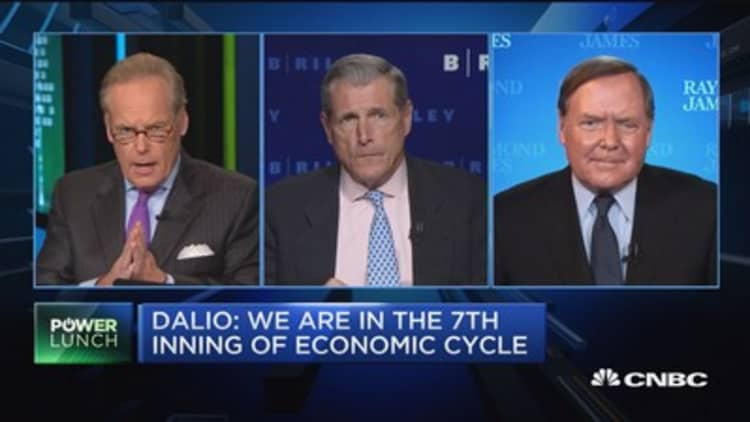
Hedge fund billionaire Ray Dalio may be warning about the economy and stock market, but Wall Street bull Jeff Saut isn't changing his thesis.
Saut told CNBC that he still expects the market to continue its run higher for quite a while, pointing out that secular bull markets tend to last 16 to 18 years.
In an interview with "Power Lunch" on Tuesday, he said, "1949 to 1966: yes, there were pullbacks didn't stop the secular bull. '82 to 2000: yes, we had the crash in 1987. [It] didn't stop the secular bull market."
March 2019 will mark the 10th year of this bull market, and "We ought to have another seven to eight years left," he said.
Earlier in the day, Dalio told CNBC that the current economic cycle is in the seventh inning and predicted it has about two years left to run.
The co-chairman and co-chief investment officer of Bridgewater Associates warned that investors should be "more defensive" in the stock market and "as time progresses" he sees the risks increasing.
Art Hogan, chief market strategist at B. Riley FBR, said it is "too easy" to use sports analogies in an economic cycle, noting that there are so many things that can "cause a rain delay or get a game postponed."
"That can be … policy mistakes, whether monetary policy that gets too aggressive at the wrong point in the cycle, fiscal policy that stimulates when we didn't expect it to and the third is trade policy," he said on "Power Lunch."
Hogan said he's particularly concerned about trade and China. While Dalio said they're not "that big of a deal," Hogan said he thinks the problem gets larger.
In fact, while he thought once the midterms approached there would be good news on trade, he said now it feels like there is escalation choreographed around the election cycle.
"It just makes this problem worse and longer and I think it's going to be a drag on the global economy," he said.
President Donald Trump has been targeting what he calls unfair trade practices around the globe, coming out particularly hard against China. The latest U.S. tariffs on $16 billion of Chinese goods were implemented last month, and were followed by $16 billion worth of retaliatory tariffs on the U.S. by China.
Trump threatened on Friday to smack China with an additional $267 billion worth of tariffs. China has vowed to respond.


